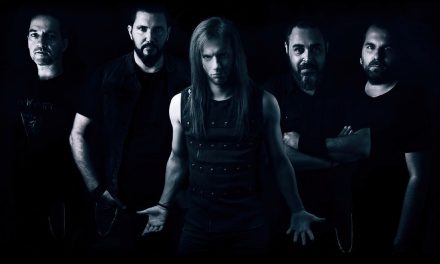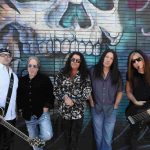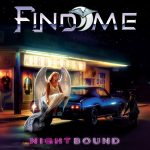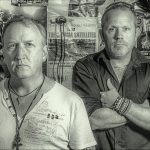
Back On The Mean Streets with Riot V
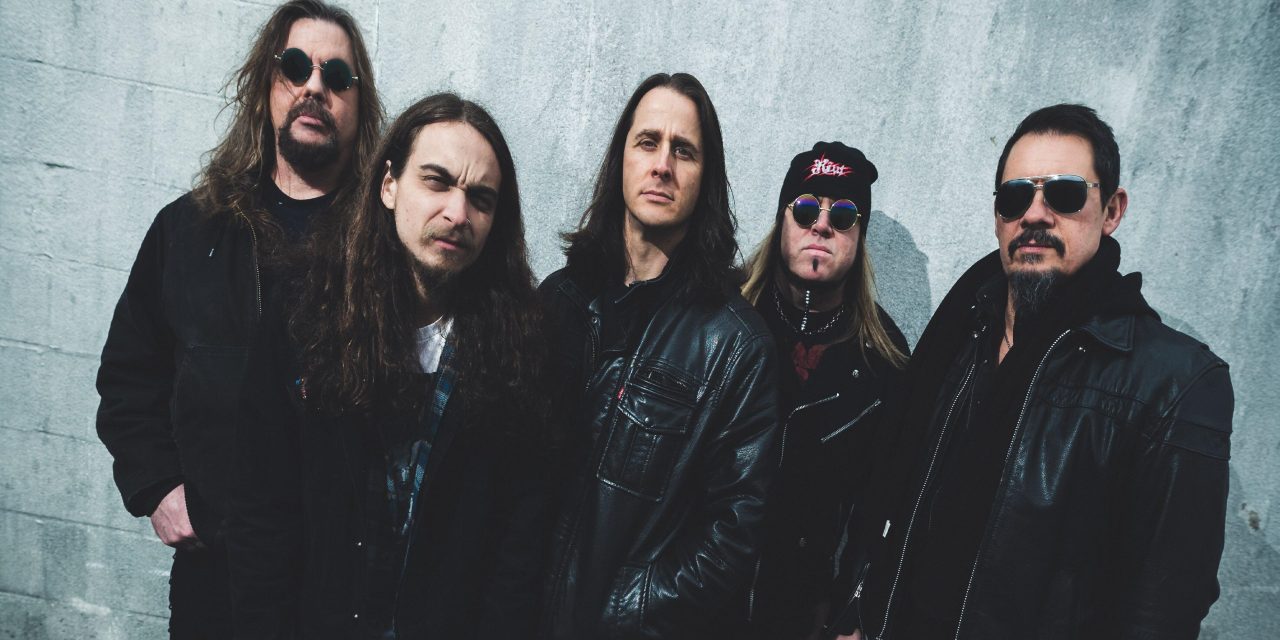
 Back On The Mean Streets with Riot V
Back On The Mean Streets with Riot V
Heavy metal was born on the streets. And on their ripping new album Mean Streets, NYC legends RIOT (V) take heavy metal back to the streets. Back to where it was born. Back to where it belongs. Founded in 1975 – almost a whooping 50 years ago – by Mark Reale, the band all but dominated the US metal scene in the ‘80s, bursting out of New York City with ground-breaking albums Fire Down Under (1981) and Thundersteel (1988). After the tragic death of Mark Reale back in 2012, the surviving members reformed the band to RIOT (V), honoring his legacy and continue to spawn world-class, hard-hitting, gritty heavy metal in the way it was meant to be played. With amps on eleven and the pedal to the metal!
Highwire Daze recently caught up with bassist and longtime member Don Van Stavern to discuss the epic new Mean Streets endeavor, the ongoing RIOT (V) legacy in honor of Mark Reale, their recent standout performance at LA Burning Fest 3, and more!
We’re here Don Van Stavern from Riot V. First of all, let’s talk about the new album, Mean Streets. Can you give me a little background behind the title, Mean Streets, and what it means to you?
Mean Streets, it took a while. I think Armor of Light came out six years ago, so it took us a while. It was during the lockdown period and all that garbage that was going on, so it was hard to get together and do things and fly and stuff. Within that time, we had all that time to write music. We demoed a bunch of songs, and Mike wrote a lot, and I wrote a lot. We always write more, like, 20 songs, and we pick the best 12.
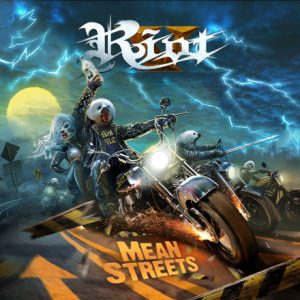
We moved forward with that, and we picked the name, Mean Streets, because we felt like… I wrote the song and the lyrics. I write all my lyrics, usually, and we thought about Hail to the Warriors, the first track on the record, but we thought that might sound a little too much power metal-y Manowar. We’re Riot. We’re more like power metal but hard rock. The lyrics to Mean Streets were about Riot’s starting in Brooklyn, New York, 1975, then releasing Rock City in ’77, and then I moved up there 10 years after. There’s lyrics about how we went to the city and went to this club and played this club and started off doing things this way and stuff. It was about our Johnny character – the word Johnny, we have in a lot of songs and based on New York City, so Mean Streets seemed like the perfect idea. That’s how we came up with it.
The artwork, you give it to the artist, Mean Streets is what we’re going for, and of course, he puts a biker gang, motorcycles, but with, of course, our evil seal. Not really evil, but we probably have the most mellowest mascot but people come to know and love Johnny the Mighty Tior – so we put him on bikes, so it fit. The whole concept came together, and we’re happy. We’re happy with the record.
High Noon, the debut single – give me a little background on that song and the lyrics behind it.
That was one of the first ones I did write. I wrote High Noon lyrics and all. I wanted to, like I said, touch base on some of the past stuff I did, like on The Privilege of Power and Thundersteel. I said, “I’m going to write a song like On Wings of Eagles or Dance of Death,” a real F#, bouncing around and stuff, like me and Mark would write, but I had Mark in mind for the lyrics because Mark was my mentor. He taught me a lot from when I joined 40 years ago, almost. He was into Westerns that’s why he had songs like Outlaw, Gunfighter, Restless Breed. He was into that. He liked Western movies, he wrote lyrics, so I said, “You know what? I’ll write the heavy music like I do but then I’m going to channel Mark, and I’m going to write Western lyrics, High Noon and do a course like he always liked to do, too.”
One thing Mark taught me was years ago, I was real fast. I would write all the fast Flight of the Warrior and Thundersteel stuff and he would say, “Well, you always got to have that chorus that’s a sing-along that the crowd wants to chant,” like “Shine on,” always stuff like that. High Noon, I went, “High noon underneath the sun. High…” that kind of stuff, the combination of the heavy riff and the real melodic vocal lines. Todd Michael Hall, of course, did an amazing job. He had the chops and the swagger to go along with the lyrics.
That came out as the first lyric video because the label loved it. They were like, “Let’s put this out first,” so that’s what we did.
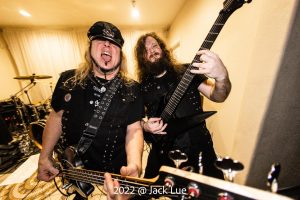
Oh, God.
What was it like playing in such a tiny space with crazy fans right in your face?
Well, yeah, that was different, and that was probably the only time that’s ever happened to us. We played some smaller venues, but not like that, like a wedding hall. Well, what ended up happening was it was thrown together by two guys, and it was a little sketchy here and there with the production and everything going back and forth and people disappearing, so we weren’t even going to do it, to be honest with you. But we were down there because we played another place, and so we were like, “Well, let’s go through with it.” Initially, while you were there, you probably saw they had the big stage on the outside built with the scaffolding and lights. Well, they said there was some kind of sound thing going on, so they couldn’t do the bands out there. They said, “We’re going to move you inside.” I don’t know if you remember, but it took forever. They had to move everything, low ceiling, no lights. They put one white light. I remember we were thinking about it, and we were talking to Ross The Boss. He was there. “Are you going to do it?” And he says, “We might as well do it. There’s fans that are here and have paid. This is odd for us, but let’s just do a real friendly low-key show for the fans up close and personal,” so we decided we would go ahead and do it. We discussed and we said, “Ah, let’s go out there and have a good time.” We went out there, and it wasn’t our big setup with the scrims and banners in our equipment, so we were just like, “Let’s just have fun.”
We ended up doing it. It turned out great. It was the first time we’ve done something like that, but our fans have always been passionate. That’s what keeps us going. When you come out and you see that, you just give it all you’ve got even though it’s small. That’s what we did. We did it. It’s definitely one for the books. We talk about it sometimes, but we had a blast. It was fun.
Let’s go back to 1998 in the first album that that you were on, Thundersteel. Looking back on that album and that time in retrospect, what do you think of it now?
Well, it’s the first record I did with Riot, so it’s very special to me. There’s a lot more to it than it just coming out as a Riot record. There’s two records in Riot’s history that are always the biggest and we play the most songs that sold the most records. Fire Down Under, obviously, and then Thundersteel. Those are the two biggest records. It means a lot to be up there with that in the Riot history. But Thundersteel, I knew Mark 10 years before I actually joined the band. I knew him when they were getting Rhett Forrester in the second phase of Riot. I remember him playing me Rhett on a cassette tape, and I just said, “Wow, that’s way different!” He did that style, but I helped him write four songs on Born in America so we were already writing. We had this solo band called Narita. It was Steve Cooper on vocals from the band S.A. Slayer that I was in, Dave McClain from Machine Head and now Sacred Reich, so we were recording demos already. Sign of the Crimson Storm, we wrote when I joined Riot in ’84. ’85 was when I was writing, so there’s versions with Rhett Forrester and Sandy Slavin and me and Mark doing Crimson Storm, which ended up on Thundersteel, and then the Narita solo band of Mark’s, we wrote Thundersteel, Fight or Fall, and a couple tunes which we took with us.
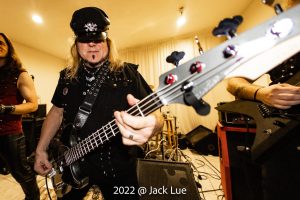
We were in LA at the time, we moved back to New York, we got the same producers that did the very first record, and they got us to deal with CBS and Epic Records. We ended up getting a new singer and a drummer because Sandy didn’t want to go in that direction and Rhett didn’t fit, although Rhett was going to try it. We got Tony Moore and Bobby Jarzombek, great drummer, who’s now with Fates Warning, Halford, Sebastian Bach, now he’s playing with a country music legend George Strait. But we recorded a record that was like Fire Down Under on steroids. It was real fast, and it was well received even though it was way different. It was challenging, but it worked. We got a big deal and toured.
Thundersteel was great and after that, they picked up the option. We did another record with CBS, The Privilege of Power, and we did that as a conceptual kind of record with all sorts of news clips. That’s when I recorded with the band, those two, and then I took a break for a while.
I had a lot of history with Mark, not only musically, but he was my best friend. He lived with me, I lived with him and his family, he lived with me and my gal. It’s an honor to keep moving on in his honor and the legacy and able to still be going after my 35 years plus, and this will be Riot’s 17th record!
Let’s go to 2011, Immortal Soul, which was Mark’s final album with the band. When you look on that album and that time in Riot’s history, what do you think of it now?
Well, that was after I had left the group for a while for some of the discrepancies with money and management. Bobby would be out playing with all his bands, Fates and some other stuff, and Mark was was doing the Mike DiMeo years, and they both basically came to me and said, “People want Thundersteel back.” Like I said, the two records, Fire Down Under and Thundersteel, were the best. Guy Speranza passed away, so they were looking for the Thundersteel lineup. I was like, “Wow. Yeah.” It was years later, but I just said, “We got to do it the right way. We got to get all the original members.” Bobby Jarzombek was the one that contacted me so he was in, Mark contacted me so he was in. Tony Moore, it took a little negotiation. He’s a little older and he was like, “Wow. I got to get out there and sing this stuff again.” It took a little negotiating with him, but in the end, he decided to join. We already had Mike Flyntz with us.
When we did Immortal Soul, and during that time, Mark was sick. He had the Crohn’s disease and it was good and bad. Throughout the years, he would go in the hospital, come out, go in the hospital, come out. I would take him to the hospital, they would give them medication, and he was taking medication and meds and just all this stuff. That was crazy.
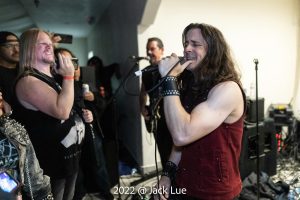
We played some festivals and shows and stuff like that. Mark couldn’t travel to do a couple shows. He said, “Do it.” Okay, we did one, and then we did a ship cruise. We were on 70,000 Tons of Metal and way out in the ocean, and we get the horrible phone call that Mark passed away and we were on a ship. We had to play another show, and of course, we were way bummed out. We played the show dedicated to Mark, HammerFall got up and played with us, all the bands were dedicating the show. It was tough because we knew once we got back, we had to deal with Mark in the situation because he was an only child. His father was the only one alive, 90 years old.
We got back and we had to do the horrible duty of doing the funeral, paying for everything, and taking care of all that stuff. At that time, after Immortal Soul, Mike Flyntz, he was hit the hardest. He was the guitar partner with Mark for a while. He said, “Yeah, it’s over. We’re done.” That’s what we thought. We thought that might be it.
Almost a year later, the record label we were under contract even though a member dies, it gets you still in a contract. They said, “Are you going to do another record? We understand if you won’t do it,” because of course, Mark. I said, “Well, we might do it. I’ll start writing demos, and we’ll contact people and do it the right way,” because we don’t want to do it how people… they rely on the name, the brand. We want to do it in a classy way where we’re not living in the past. Mark’s father gave us the blessing. He said, “Please don’t bury Mark’s music with him. That’s what keeps him alive, his music.” I was like, “Wow! Yeah!“
I wrote demos, and we recorded them, and then right before we were going to continue, Tony Moore opted out. He says, “Yeah. I don’t think I want to do it more.” Besides Mark passing, he said, “I’m getting older. The high is real tough,” and then Bobby, he helped record but he was in four bands. He says, “I’m going out with Sebastian then I got to do this.” We got to move forward.
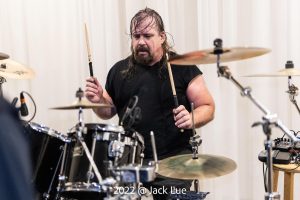
I sent it to Mike, and Mike goes, “Oh, man. This makes me want to get back.” Sent them to the label, and they were floored. They were like, “This sounds great. It didn’t miss a beat.” We said, “Well, let’s do it, but let’s do it in a classy way. This is for Mark. This is for our leader. This is for the legacy of Riot!”. We were moving forward. It’s not a cash cow. It’s never been a cash cow. We all have regular gigs. It’s passion. We do stuff. We make money a little bit here and there, but it’s not like we’re Metallica.
Anyway, we ended up moving forward with Unleash the Fire, and that was the rebirth. I said, “Well, let’s call it the Fifth Chapter,” because it’s moving forward from my Thundersteel era, Immortal Soul was a Thundersteel lineup, and we’ll move forward in the power metal. We’ll call it Riot V or the Fifth Chapter. It’s still Riot, but some markets call us V and some don’t. They just use Riot.
We continued on and we finished the record. We got new members. Bobby couldn’t do it, we got Frank Gilchriest from Virgin Steele, then Todd, we already had, and then Mike got one of his guitar students, Nick Lee, young guy, amazing. The whole unit recorded Unleash the Fire, and we said, “Let’s go out and play a tour, put it out and see what people think.” Boom! It was great! The fans came out, they didn’t miss a beat. We played it, we brought Mark’s guitar case out. We’ve always been respectful to this day. I bring out my tequila bottle and hold it in the air, do a cheers. We’re doing it the right way in the Riot legacy moving forward. The record got great reviews, the shows did, so we continued on. Of course, we signed to the great Nuclear Blast.
The next record, Armor of Light, same lineup, recorded a great, more power metal record, this one, and people loved it. We had some big tours, big festivals. We were like, “Wow. We’re moving forward.”
The lockdown, of course, the big Covid thing, we were out of the loop for six years, but after, we went through three producers, writing the music like I was talking about, and then we finally got everything in line, and same lineup. This is three records with the same lineup. Never been done.
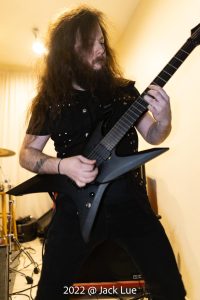
Do you have any messages for Riot fans who are reading this right now?
We can’t say thank you enough because we do it because of them. Like I said, this has never been us doing it for the money because it’s never been a cash cow. We do it for the passion. We all have gigs, and if it wasn’t for the fans wanting it or digging the music, there’d be no reason to do it anymore. We don’t do those paid meet and greets. I know a lot of bands do it for the extra income, and it might help us a little bit, but we’ve always been… you just bought a ticket to the show which aren’t cheap. You bought all my records, so here, I’m going to charge you $100 to take a picture with me. We’re like, “No, get over here. Do a shot.” You know what I’m saying? It’s always been for our Warriors. We call them the Warriors. We always use the word Warriors. That’s our fans, and we continue on for them because they like the way that we are moving forward. It’s done in a classy way where it’s not a brand, it’s about the music and the people.
We celebrate the history of Riot. That’s why we’re where we’re at right now because Mark used to say, “The longevity of a band is through great music,” so if you keep putting out quality stuff, people will be there. If you start putting out duds, you know, they’ll fall out. Thank God, people seem to think we’re carrying on in the right way so we definitely do it for the people, for the fans, definitely.
Thank you, fans. We love you, Warriors!
Mean Streets by Riot (V) will be out April 12th via Atomic Fire Records!
(Interview by Ken Morton – Live Photos from LA Burning Fest 3 by Jack Lue)
Riot V Official Home Page

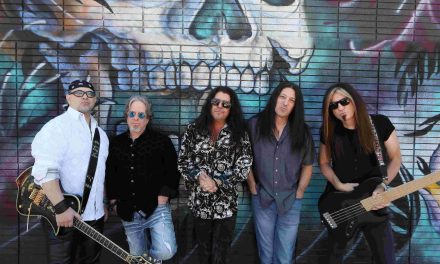
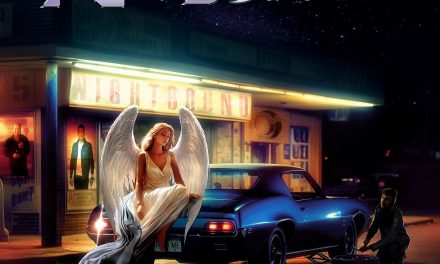
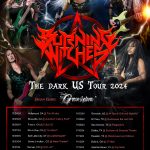
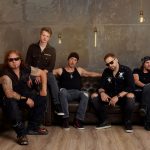
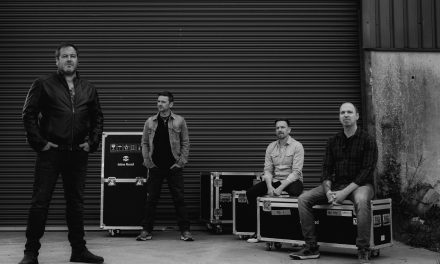
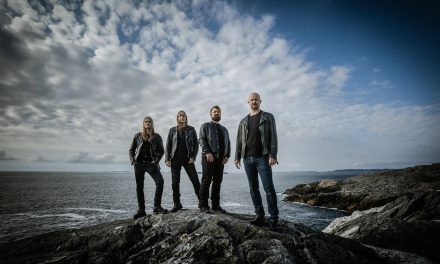
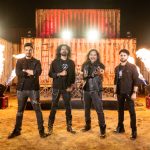
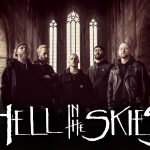

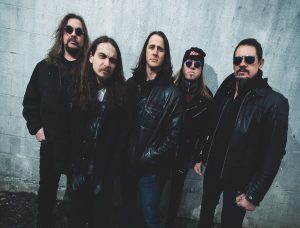 Back On The Mean Streets with Riot V
Back On The Mean Streets with Riot V
